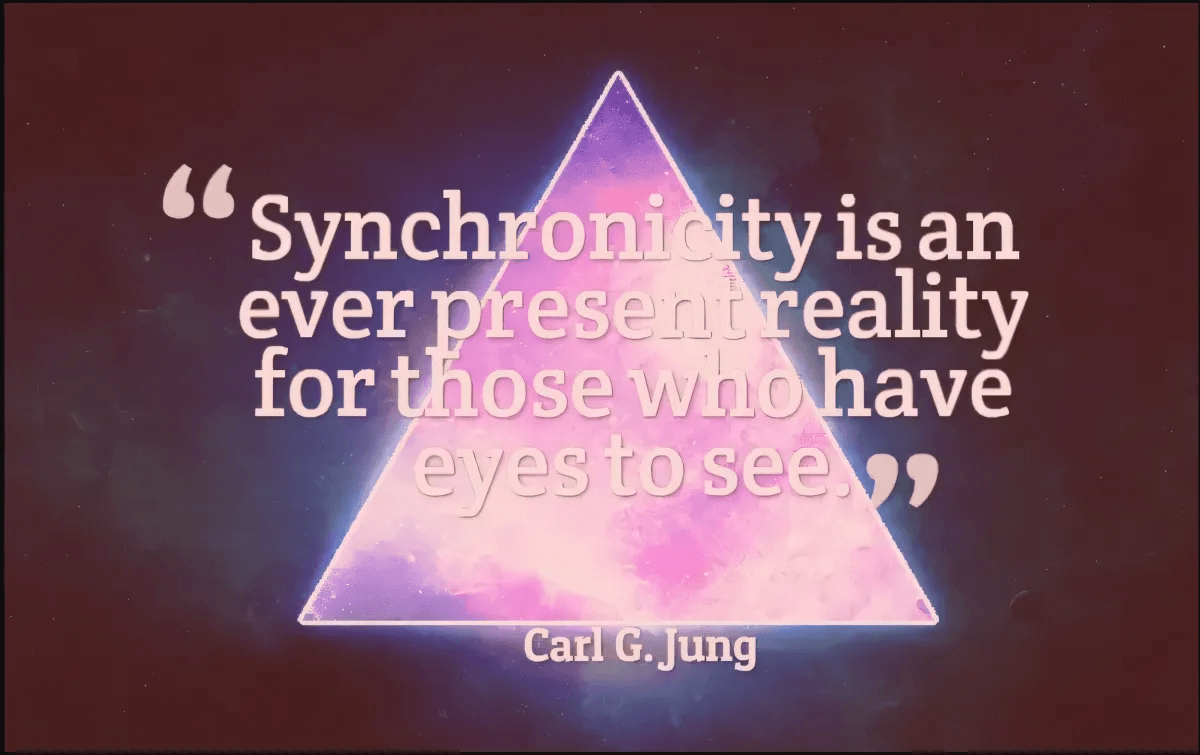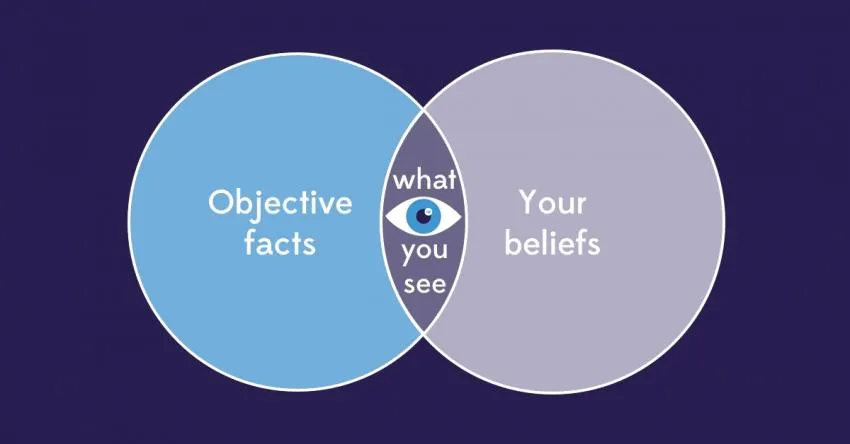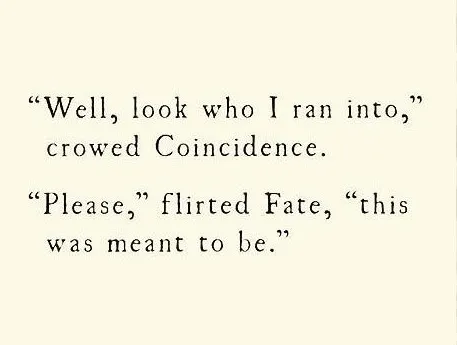Does Synchronicity Really Exist?
Synchronicity has been a term that not many people seem to be able to define. I, myself, have experienced synchronicity quite often whether it is through experiences or physical synchronicity.
Many people, in various professions, seem to think that synchronicity is either coincidence, various coincidences that don't have a reason for being, that it is confirmation bias, anecdotal, or that synchronicity can't be possible because everything happens at an individual level and not in a unified field.
But what are coincidences and confirmation bias? What is synchronicity for that matter? We will see below.
What is Synchronicity?
The term synchronicity was first coined by Carl Gustav Jung, a psychoanalyst, and introduced in the 1950s when his works on the subject were published.
Carl Jung described synchronicity as meaningful coincidences, comprising of two or more events, that have no cause of being. In other words, things that happen for no apparent reason but are deemed meaningful by the person experiencing them.
Different views of Synchronicity
As with everything in life, many people and groups have different views, meanings, and experiences with synchronicity.
Depending on where you look, you will see that some agree with the existence of synchronicity while others dismiss it completely. Some may agree with Jung or have their own definition of what synchronicity is.
Next, we discuss different views on synchronicity from different scientific perspectives, mainstream opinions, and the spiritual perspective.

1. What is synchronicity in the spiritual community?
For those in the spiritual community, synchronicity is basically a series of events or signs from the universe, spirit guides, or the Creator that carry a message for the individual or confirm whatever that individual needs confirmation on.
They are not only meaningful but are also connected and there is a reason and cause behind their manifestation. Deepak Chopra, for example, views synchronicity as the organizing ability of pure consciousness.
Robert Kopecky, a contributor to Gaia, says that synchronicity has more to do with practical yet deeply mysterious life-long relationships to natural phenomena of all kinds.
While Loner Wolf, a spiritual awakening support website, describes synchronicity as a string of events that seem to be highly symbolic and meaningful in nature.
As you may see, for the spiritual community all is connected, has a meaning and a cause although those details may not be known at the moment of the events happening.
This is not so for other groups, though.
2. What is a Coincidence?
A coincidence is described by dictionaries as a remarkable concurrence of events or circumstances without apparent causal connection.
Much like Carl Jung's definition, this one also displays synchronicity as having no causal connection to the person, as well as not even being meaningful only remarkable.
Many people believe that events or circumstances that cannot be explained are coincidences and don't believe in synchronicities. Or, they believe that synchronicities are just coincidences that others put too much meaning into.

3. What is Confirmation Bias?
According to an article in Verywell Mind, confirmation bias involves favoring information that confirms your previously existing beliefs or a feeling, opinion, or inclination that is preconceived, sometimes even unreasoned.
Confirmation bias is a term used mainly in psychology. Among the behaviors presented, confirmation bias makes the person search for and interpret information in their favor based on their own experiences and beliefs.
Those in the field of psychology that do believe in synchronicity define it as the occurrence of a meaningful coincidence that seems to have no cause.
4. Anecdotal view of synchronicity
According to an article written by Robert Kopecky, the anecdotal view of synchronicity stems from materialism and the apparent lack of proof.
The anecdotal view of synchronicity consists of believing that because the situations experienced during synchronicity are based on personal accounts rather than facts or research they are unreliable or not necessarily true.
5. Synchronicity and the individual field
Another way that science views synchronicity is by not viewing it as anything at all but dismissing it completely.
According to Robert Kopecky, the materialistic scientific view considers that everything is individual and doesn't work in a unified field. Meaning that nothing can blend, harmonize or unify. And for these reasons, it doesn't exist.

Coincidence? I think not
Some definitions of synchronicity make it a "series of coincidences that are meaningful but have no cause". Based on my and my families' experiences I will have to differ on this.
Ever since I discovered the world of spirituality I have been drawn to watching pick-a-card readings on Youtube. Seeing as every reader is different, their deck of cards is different and the piles they create are different, there's no reason for an audience member like me to have the same type of reading, right?
For all the pick-a-cards the cards are all in reverse so the audience only sees the back of the cards and has no idea what type of cards or messages are in the pile. So, there should be no reason for me to see different pick-a-cards from different readers and have the exact same reading or similar readings, right?
Well, that is exactly what is happening to me. Every time I see a pick-a-card reading about career or soul purpose I always pick the pile that says I am meant to be a teacher, a healer, a master, and a writer. Mind you, all the cards are reversed so I can't consciously know what the cards say underneath, and mind you they are all from different readers.
So, one can't say that I deliberately chose the pile that had those messages in it because I didn't know. What also might seem strange, is that it has been happening since the summer of 2019 without fail.
Tell me, does this seem like a coincidence to you? I prefer to call it synchronicity, probably on steroids. A message that the Divine and my spirit guides want me to understand so they keep urging me to pick the piles with that same message.
Can synchronicity be confused with confirmation bias?
Synchronicity can be confused with confirmation bias but they are not the same thing.
Confirmation bias involves favoring information that confirms your preexisting beliefs, and sometimes it makes you actively look for that information.
On the other hand, when it comes to synchronicity, the person who experiences the synchronistic events usually isn't looking for it, nor even actively thinking about it.
I was definitely not actively looking to get the exact same message about being a teacher, a writer, a healer, and a master. Quite the opposite, I was looking to see if the cards said something else entirely. This is why, in my experience, I do not think that synchronicity is confirmation bias.

Synchronicity in interpersonal relationships
While the definitions about synchronicity above are some of the most common, there are other definitions out there.
For example, in the book The Mindful Librarian, authors Jo Henry and Howard Slutzky talk about interpersonal synchronicity and how it refers to an interpersonal interaction that takes place at the same time between individuals.
While the authors don't outwardly link interpersonal synchronicity with spirituality they do relate to mindfulness and how it is beneficial to people in a work environment and in general.
According to Henry and Slutzky, studies have shown how interpersonal synchronicity is an optimal experience that with social interaction can alter the neural system of the brain and improve relationships between two people when there is mindfulness involved.
Some of the physical effects of experiencing interpersonal synchronicity are synchronized hearts, feeling positive and if you really think about it, synchronized periods. Henry and Slutzky, state that these harmonious experiences can take place between two or more people.
The fact that you can have synchronized physical functions negates the belief of the materialistic view.
Because when two or more people are synchronized, essentially they go from being individuals to working in a unified field of their own creation.
Synchronicity happens when you're ready and the environment around you is ready. If neither things are at their peak then it doesn't happen.
Does synchronicity really exist?
And finally, does synchronicity really exist? Well, that truly depends on you and what you believe.
Do you believe that you can get messages from the Divine? Or do you believe that it is all a coincidence or non-consequential?
This is something you have to answer by yourself. As for me, I do believe that synchronicity exists, not only that I believe it does have a cause, I also believe that it is all connected.
Opinions and Perspectives
The relationship between quantum physics and consciousness might hold some answers.
As a counselor, I've seen how acknowledging synchronicity can aid in personal growth.
I've found that being open to synchronicity has enriched my life in unexpected ways.
Sometimes what looks like synchronicity might just be our pattern-seeking minds at work.
The connection between mindfulness and synchronicity deserves more research attention.
The question isn't whether synchronicity exists, but how we interpret and use these experiences.
I appreciate how the article acknowledges both the scientific and spiritual perspectives.
Whether it's coincidence or synchronicity, these experiences often lead to meaningful insights.
The workplace synchronicity examples are fascinating. I've experienced this with certain colleagues.
I've noticed that skeptics often dismiss synchronicity without really investigating it.
The article's discussion of confirmation bias versus synchronicity is particularly helpful.
The concept of a unified field makes more sense when you consider quantum entanglement.
I think we need a new scientific framework to study these phenomena properly.
The spiritual perspective resonates with my personal experiences, but I understand why others might be skeptical.
As a researcher, I'd love to see more empirical studies on interpersonal synchronicity.
The article could have explored more about how technology might be affecting our experience of synchronicity.
I've found that synchronicities often appear when I'm making important life decisions.
The distinction between causation and meaning is crucial here. Something doesn't need a direct cause to be meaningful.
I find the relationship between quantum physics and synchronicity particularly intriguing.
Whether you believe in synchronicity or not, being open to meaningful patterns can enrich your life experience.
The example of synchronized periods is actually a documented phenomenon that supports the concept of interpersonal synchronicity.
The article presents a balanced view, but I still lean towards the skeptical side.
I think Jung was onto something profound that we're only beginning to understand.
The connection between mindfulness and synchronicity deserves more attention. I've noticed more meaningful coincidences since starting meditation.
As someone who works in probability theory, I can say that some of these 'meaningful coincidences' are more statistically likely than people realize.
The article could have explored more about how different cultures view and interpret synchronistic events.
I wonder if what we call synchronicity might be our limited perception of a higher-dimensional reality.
The research on synchronized physical functions is fascinating. I'd love to see more studies in this area.
My experience with synchronicity aligns more with the spiritual perspective presented in the article.
The concept of meaningful coincidences having no apparent cause seems contradictory to me.
I appreciate how the article differentiates between confirmation bias and genuine synchronicity.
The section about interpersonal synchronicity in the workplace is particularly relevant to team dynamics.
As a meditation teacher, I've noticed that people tend to experience more synchronicities as their practice deepens.
Great article but I wish it had explored more of the neurological aspects of pattern recognition.
The scientific community needs to be more open to studying these phenomena without dismissing them outright.
I've had similar experiences with Tarot readings that can't be explained by chance alone.
The author's personal experiences with pick-a-card readings are compelling, but I wonder about the role of subconsciousness in card selection.
The distinction between actively seeking patterns and having them appear naturally is crucial to understanding true synchronicity.
My background is in physics, and I find the unified field theory connection intriguing. There might be something there worth investigating.
The material about mindfulness and its relationship to synchronicity is particularly relevant in today's stressed-out world.
I think synchronicity exists, but we tend to over-attribute ordinary coincidences to it.
The article could have mentioned more about the role of intuition in recognizing genuine synchronicity.
Has anyone else noticed that synchronicities often come in clusters? It's like when it rains, it pours.
The section about interpersonal synchronicity in relationships really resonates with my experience as a couples counselor.
I love how the article encourages readers to make up their own minds rather than pushing a particular viewpoint.
The unified field concept actually aligns with some cutting-edge physics theories. Maybe science will eventually catch up to Jung.
As a psychology student, I think we need to be careful about distinguishing between genuine synchronicity and confirmation bias.
I've experienced too many meaningful synchronicities to dismiss them. They've guided me through some of life's biggest decisions.
The article's example of pick-a-card readings is interesting, but couldn't that just be subconscious influence at work?
Sometimes a coincidence is just a coincidence. We need to be careful not to over-interpret everyday events.
The interpersonal synchronicity research mentioned is fascinating. I'd love to see more studies in that direction.
After reading this, I realize I've been confusing coincidence with synchronicity. There's definitely a meaningful difference.
The materialistic view seems too rigid. Just because we can't measure something doesn't mean it doesn't exist.
Whether it's divine guidance or not, paying attention to synchronicities has led me to some amazing opportunities I might have otherwise missed.
I find it interesting that different cultures throughout history have had similar concepts to synchronicity, just under different names.
The article could have delved deeper into the quantum physics aspects. There's some fascinating research being done in that area.
My therapist actually uses Jung's concept of synchronicity in our sessions. It's been incredibly helpful for personal growth.
The distinction between actively seeking confirmation versus having synchronicity find you is crucial. That's what separates it from confirmation bias.
I work in probability and statistics, and I can tell you that what seems impossibly meaningful often isn't that improbable when you do the math.
Anyone else notice how synchronicities tend to increase during major life transitions? I've found they often point the way forward.
The Deepak Chopra quote about pure consciousness organizing synchronicity events makes sense to me. We're all connected in ways we don't fully comprehend.
Not buying it. Our brains are pattern-seeking machines. We remember the hits and forget the misses.
The concept of a unified field mentioned in the article reminds me of quantum field theory. Maybe there's more to this than we currently understand.
I appreciate how the article presents different perspectives without pushing any single viewpoint as absolute truth.
What about quantum entanglement? Could that potentially explain some aspects of synchronicity at a scientific level?
The synchronized periods phenomenon mentioned is actually backed by scientific research. It's called the McClintock effect, though some recent studies dispute it.
Interesting how the article mentions synchronicity in relationships. My wife and I often finish each other's sentences. There's definitely something there that science hasn't fully explained yet.
I think both the strictly materialistic and purely spiritual views miss the mark. The truth probably lies somewhere in between.
The pick-a-card reading example really struck me. I've had similar experiences that are hard to explain away as mere coincidence.
As a scientist, I find it difficult to accept something that can't be empirically tested or measured. Where's the evidence beyond personal anecdotes?
The article makes a good point about the difference between confirmation bias and genuine synchronicity. I think many skeptics conflate the two.
I'm not fully convinced by the spiritual interpretation. While I believe meaningful coincidences occur, attributing them to divine messages seems like a stretch.
The part about interpersonal synchronicity is particularly interesting. I've noticed this phenomenon with close friends where we often think the same thoughts or say the same things simultaneously.
Jung's definition resonates with my personal experiences. Just last week I was thinking about an old friend and she called me out of nowhere after 5 years.
I respectfully disagree. What people call synchronicity can be explained by basic probability and our brain's tendency to find patterns even where none exist.
Fascinating article about synchronicity. I've experienced too many meaningful coincidences in my life to dismiss them as random chance.
